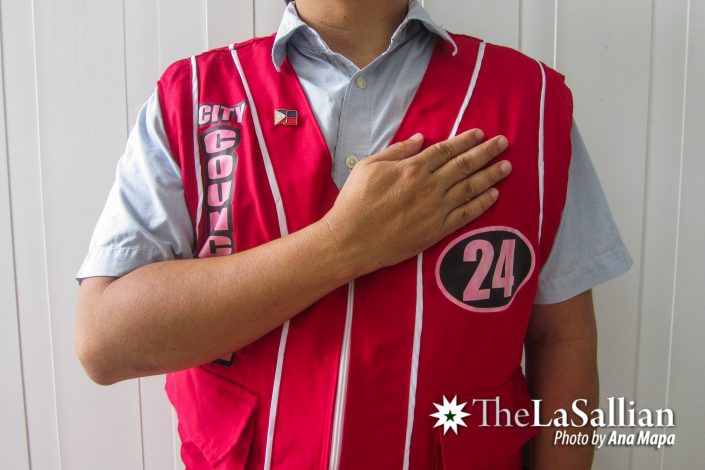Both policies and principles influence the courses of action that government officials take hoping to improve the people’s quality of life. As youth leaders rise to the occasion of effecting positive change in their respective contexts, different strategies are vital to bridge their promises and ideals into materializing as effective policies and programs.
Such aspects of public service were discussed in From Principle to Policy: The New Wave of Youth Leadership, a webinar featuring Kabataan party-list Rep. Sarah Elago, Pasig City Mayor Vico Sotto, Brgy. Payatas Sangguniang Kabataan Chairman Lesther Pangilinan, and University of the Philippines Sociology instructor Athena Presto. The event was hosted by youth organization Project Insight, in partnership with the University Student Government, Labang Pangkalusugan, When In Manila, and Philippine Star, last July 24 via Zoom and Facebook Live.
Promises, principles, policies
“We have to power through the legislative process,” voiced Elago, as she highlighted the challenges faced in pushing for reforms and in moving from bills to distinguishable progress. With what she describes as a “collective, democratic, and participative” leadership style, the congresswoman emphasized “raising the voice of the underrepresented and marginalized” sectors of society.
Sotto admitted that he still does not have all the solutions to the problems of Pasig City, but efforts toward inclusive leadership—“making sure that experts are involved and people from the grassroots [level] have their say [in policymaking]”—helps his unit deliver effective and tangible developments. This also translates to empowering the public as “not just beneficiaries of government programs, but [rather] partners [who] have an actual stake and sense of ownership” over community initiatives.
With these visions, however, Sotto recognized that “fighting a battle at a hundred fronts” may prove futile, instead opting to subscribe to the principle of “idealismo na nakabatay sa realidad”. He furthered, “You have to be strategic…[to] push for change and effect change efficiently.”
(Idealism grounded in reality.)
“We have to be firm in our principles but flexible in our tactics,” Elago echoed.
Touching bases
In a fast-paced and evolving world, the need to recognize and address the plight of the people remains unchanging. Elago elaborated how she keeps in constant communication with her constituents. “Sa Kabataan, mabilis ‘yung pagsasabi [ng mga pangangailangan] agad sa mga [local party-list] chapters…at sa schools naman, may mga teknolohiya para makapag-padala ng update,” she expounded.
(Kabataan moves quickly to voice out their needs to the local party-list chapters…and in schools, they (Kabataan members) have the technology to send updates.)
Sotto stressed that local government work is an “action-packed role” that is “very direct to the people”. The quarantine situation, however, has reduced on-the-ground visits to different households and areas of the community—making “social media play a bigger part than it normally does,” according to Sotto.
For the mayor, social media has allowed his constituents to continue to reach him in a safe and fast way, as well as has helped “anyone [to] participate and make their voice heard.”
Pangilinan, meanwhile, deemed civic participation as key for empowering the youth in his constituency—championing for their inclusion in the identification of problems in the community and their possible solutions, ultimately to mold the youth to become “productive” citizens.
“Kailangan nating alamin ang pintig ng pulso ng ating pinaglilingkuran upang sigurado tayo na ang lahat ng desisyon at aksyon natin ay angkop at lubos na nakatutulong sa nakararami,” he said.
(We need to understand those we serve to ensure that all our decisions and actions are appropriate and truly help the masses.)
Stressing that a democracy necessitates a “deliberative citizenry”, Presto discussed, “[Implementing policies is] also a matter of what the voters, their constituents, the citizens would allow and demand for [public officials] to do.”

Planting hope and movement
For the panelists, age, though drawn up as a considerable strength, has also served as a springboard for critics to attack the credibility of their ideals and decisions, dismissing the youth’s idealism as rooting from a “lack of experience”.
Presto countered this, however, saying, “‘Yung idealism nila pwedeng nakukuha nila from the experience nila mismo…Our culture as Filipinos is very ageist—pinapalaki tayo na isipin na kailangan nating respetuhin ang mga matatanda kasi sila [ang] may experience.”
(Their idealism may have been developed based on their experiences. We are inculcated with the belief that we ought to respect our elders’ viewpoints because they are the ones with experience.)
Dealing with this as a young lawmaker, Elago advised that one only needs to “own [their] position” and assert their message and beliefs with conviction. Proper preparations, meanwhile, were what Sotto encouraged in order to step into one’s role as a leader even with prior limited political experience. He urged the youth to “prepare in theory, in practice, and [in] connecting with people who share the same values and principles.”
Good governance, as the panelists emphasized, does not only lay in the hands of the leaders. “It’s up to each and every one of us to exact that accountability, to demand that transparency, and to participate whenever we have the opportunity to do so,” Sotto stressed.
Pangilinan encouraged aspiring leaders and public servants to “push lang…kung alam mong nasa tama ang pangarap mo”, while Presto called on everyone to engage in sociopolitical concerns. “Don’t be scared to deviate views from other people if you know you are marshalling legitimate data and are empathizing with people in standing [for] your beliefs,” she added.
(Push forward if you know your visions are honorable.)
For Elago, “Ang hamon ay ‘di lang pag-aralan ang kasaysayan na ‘yan, ay kundi tayo din mismo bilang kabataan ay gagawa pa ng mas maraming kasaysayan.”
(The challenge for the youth is not just to learn from history, but also to make history.)
